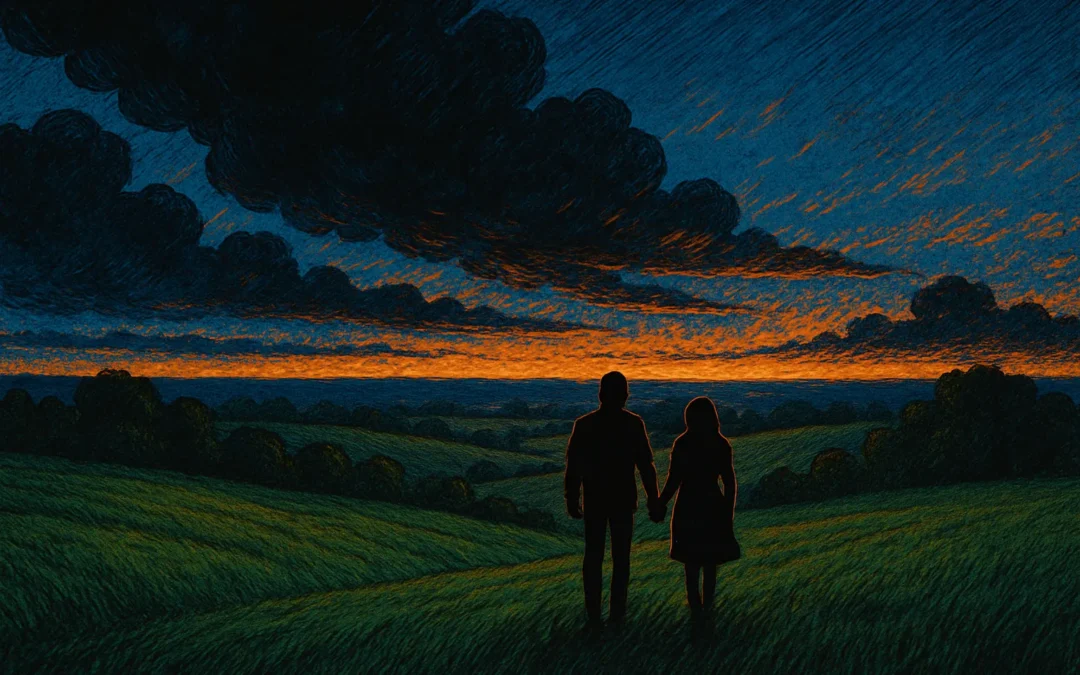The Chapter That Never Was
It was late — the kind of night where your body is ready for rest, but your mind refuses to cooperate. The quiet was heavy, the air still. I had already gone through the usual winding-down rituals — light off, phone on the side table, eyes closed. That was when it happened.
Out of nowhere, a sentence arrived, fully formed:
“The earth beneath us isn’t fighting.”
It didn’t drift in gradually. It landed with clarity, like a pebble breaking the surface of a calm pond. No connection to what I’d been thinking about, no obvious memory to latch onto. Just there. Sitting in my mind with the weight of something that mattered.
I lay there, trying to pin it down. Where had I heard it? It felt so complete, as if it must have existed before — somewhere in a novel, in a poem, maybe even in a song lyric I’d once stumbled across. The words carried a kind of timelessness, like they belonged to a much older tradition of thought.
Eventually curiosity won over the need for sleep. I reached for my phone and typed it into Google, half-expecting to be shown a dozen versions on quote websites or Pinterest boards. But nothing came up. Not even close matches. I tried variations — swapping “isn’t” for “is not,” or “beneath” for “under” — still nothing. It was as if the phrase had stepped into my mind from somewhere else entirely.
So I began pulling at its threads, trying to understand why it felt so potent. For me, it quickly took on a methodical meaning — a layered way of looking at the world:
Philosophical – the idea of living in harmony with the environment, walking through life without forcing, resisting, or battling the ground you stand on.
Poetic – an image in contrast to times when the earth does fight: when it shakes, floods, erupts, or pushes back against us.
Metaphorical – a rare, fleeting sense of stability; that moment in life when nothing underfoot is shifting and you can finally exhale.
The more I thought about it, the more it started to feel like it belonged in Dreams Don’t Always End. Not as an afterthought, but as the opening to a missing scene — a lost chapter that might have offered a moment of stillness after so much disquiet.
I imagined it taking place after the lake, after the rain, after those points in the story where the narrator is pulled between waking and dreaming. The chaos has passed. The loops have stopped. There’s no tremor in the ground, no slow, silent cracking beneath the surface. Just an awareness — not a dramatic revelation, but a quiet certainty — that the fight is over. For now.
In some ways, this imaginary chapter would have been the opposite of the book’s unsettling moments. No ripples in reality, no sense of time twisting back on itself. Just a grounding truth: the earth beneath us isn’t fighting.
And yet, I’m not sure whether including it would have strengthened the book, or changed its rhythm. Sometimes, the absence of calm keeps the tension alive, and maybe that’s why it didn’t make the final cut. Still, it lingers in my mind as a small piece of writing that could belong to a different version of the story.
It’s strange how a single sentence can open the door to so many possibilities. In another telling, it could have been spoken between two characters — a reassurance, a promise, or even a farewell. In poetry, it could stand as the final line, the rest of the verse building toward that release. In visual form, it could sit beneath the image of two people silhouetted against a horizon, their hands clasped, the world spread out in front of them.
This is why I can’t quite let the phrase go. It’s more than just a stray thought from a sleepless night — it’s a marker, a fragment of something that feels like it belongs to a wider map. A reminder that not all tension needs to be resolved with action; sometimes the resolution is in stillness.
If Dreams Don’t Always End is ever revised or extended, this could be the starting point of an epilogue, or an interlude between two heavier chapters. The narrator could stand in a wide, open place — maybe on Dartmoor, maybe by the coast — with the horizon stretched out ahead, realising that for this brief moment, nothing is shifting beneath their feet.
Or perhaps it should remain here, outside of the book’s official pages — a phrase in the in-between, offered to you without the rest of its story. Sometimes fragments are more powerful when they remain incomplete, because they leave space for the reader’s imagination to wander.
When I think back to that night, I realise what kept me awake wasn’t just the mystery of the phrase, but the feeling it carried. The peace it suggested. The sense that life doesn’t always have to be a battle — that sometimes the ground you’re standing on is quietly on your side.
Maybe that’s why it arrived uninvited, in the dark, when everything else was silent. And maybe that’s why I can’t quite let it go.
Until it finds its place, the line will live here: The earth beneath us isn’t fighting.
